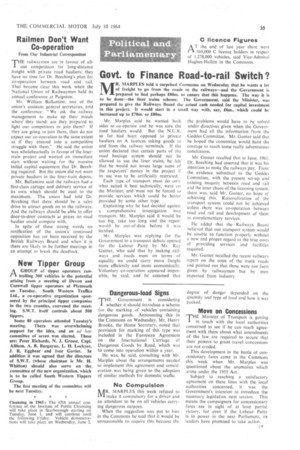Govt. to Finance Road-to-rail Switch ?
Page 37

If you've noticed an error in this article please click here to report it so we can fix it.
MR. MARPLES told a surprised Commons on Wednesday that he wants a lot of freight to go from the roads to the railways—and the Government is prepared to find perhaps £80m. to ensure that this happens. The way it is to be done—the liner trains scheme. The Government, said the Minister, was prepared to give the Railways Board the actual cash needed for capital investment in this project. It would start in a small way with, say, £6m., which could be increased up to 170m. or lettOnt.
Mr. Marples said he wanted both sides to co-operate and he was sure the road hauliers would. But the N.U.R. so far had been opposed to private hauliers on A licences taking goods to and from the railway terminals. If the union declared that certain parts of the road haulage system should not be allowed to use the liner, trains, he felt. that he would not invest large sums of the taxpayers' money in the project if its use was to be artificially restricted.
Each type of transport must do only what suited it best technically, went on the Minister, and must not be forced to provide services which could be better provided by some other type.
Explaining why he had decided against a comprehensive investigation into transport. Mr. Marples said it would be toobig, take too long and the report would be out-of-date before it was tinished.
Mr. Marples was replying for the Government in a transport debate opened for the Labour Party by Mr. Ray Gunter, who said that by making railways and roads meet on terms of equality we could carry more freight more efficiently and more economically. Voluntary co-operation appeared impossible, he said, and he assumed that the problems would have to be solved under directive S given when the Government had all the information from the Geddes Committee. Mr. Gunter said that he hoped the committee would have the courage to reach some really adventurous conclusions.
Mr. Gunter recalled that in June, 1961. Dr. Beeching had asserted that it was his intention to make the railways pay. From the evidence submitted to the Geddes Committee, with the present set-up and existing inequity between road and rail and the utter chaos of the licensing system. there was, said Mr. Gunter, no hope of achieving this. Rationalization of the transport system could not be achieved unless there was co-operation between road and rail and development of them as complementary services.
He added that the Railways Board believed. that our transport system would be unable to function properly without a new and proper regard to the true costs of providing services and facilities required.
Mr. Gunter recalled the recent railways report on the costs of the trunk roads and pointed out that these were not facts given by railwaymen but by men imported from industry.
























































































































